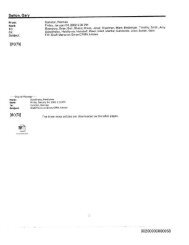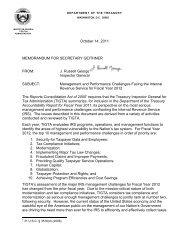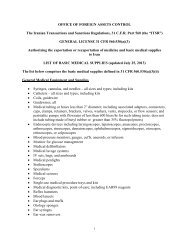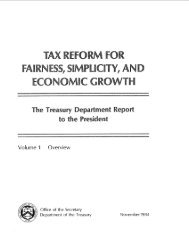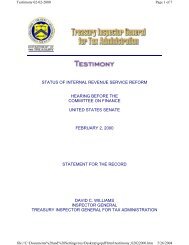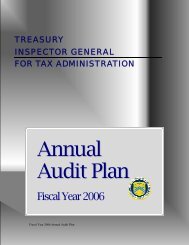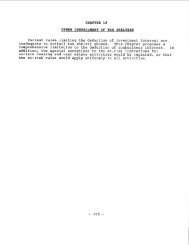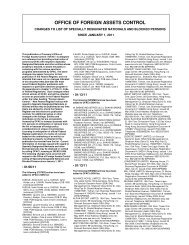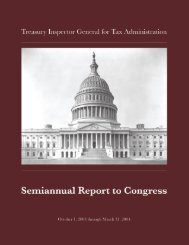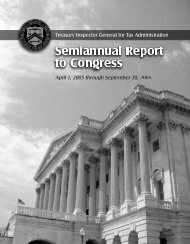Annual Audit Plan -- FY2005 - Department of the Treasury
Annual Audit Plan -- FY2005 - Department of the Treasury
Annual Audit Plan -- FY2005 - Department of the Treasury
You also want an ePaper? Increase the reach of your titles
YUMPU automatically turns print PDFs into web optimized ePapers that Google loves.
<strong>Treasury</strong> Inspector General for Tax Administration - Office <strong>of</strong> <strong>Audit</strong><br />
information needed for day-to-day decisions, <strong>the</strong> IRS’ financial stewardship<br />
responsibilities continue to be one <strong>of</strong> <strong>the</strong> largest challenges facing IRS management.<br />
Along with financial accountability, <strong>the</strong> Federal Government has a stewardship<br />
obligation to prevent fraud, waste, and abuse and to use tax dollars appropriately. The<br />
Office <strong>of</strong> Procurement, a key partner in delivering <strong>the</strong> IRS mission, awards and manages<br />
obligations that amount to nearly 20 percent <strong>of</strong> <strong>the</strong> IRS budget. Most mission critical<br />
programs rely on contract support. Competitive sourcing, an initiative in The President’s<br />
Management Agenda, will increase <strong>the</strong> Office <strong>of</strong> Procurement’s workload. Additionally,<br />
congressional concerns have been raised regarding <strong>the</strong> propriety <strong>of</strong> payments to<br />
Government contractors. TIGTA audits have also identified some issues in <strong>the</strong> contract<br />
area. For example, a recent audit <strong>of</strong> <strong>the</strong> Nationwide Electronic Tax Forum Conferences<br />
and Exhibitions Contract showed that <strong>the</strong> contractor’s documentation did not adequately<br />
support <strong>the</strong> tax forum income and expenses reported to <strong>the</strong> IRS for FYs 2002 and 2003.<br />
This audit was initiated as <strong>the</strong> result <strong>of</strong> concerns raised by <strong>the</strong> IRS, including <strong>the</strong><br />
timeliness and outcome <strong>of</strong> <strong>the</strong> contractor’s reconciliation <strong>of</strong> tax forum income with<br />
expenses. 9<br />
The CI function’s mission is to serve <strong>the</strong> American public by investigating potential<br />
criminal Internal Revenue Code violations in order to foster confidence in <strong>the</strong> tax system.<br />
In 1999, an independent review <strong>of</strong> <strong>the</strong> function, headed by Judge William Webster,<br />
reported that <strong>the</strong> CI function was drifting from its mission. Beginning in FY 2002, <strong>the</strong> CI<br />
function began to turn around <strong>the</strong> negative trends from earlier years. Specifically, <strong>the</strong><br />
number <strong>of</strong> subject investigations initiated increased, more time was spent directly on<br />
subject investigations, and fewer days were expended to discontinue a subject<br />
investigation. These indicators continued to show improvement in FY 2003. A major<br />
objective <strong>of</strong> <strong>the</strong> CI function’s strategy <strong>the</strong> last several years has been increased support <strong>of</strong><br />
compliance efforts through <strong>the</strong> increased application <strong>of</strong> resources on tax administration<br />
investigations. This emphasis is reflected by <strong>the</strong> significant increases from FYs 2001 to<br />
2002 in <strong>the</strong> number <strong>of</strong> subject investigations initiated in <strong>the</strong> Legal Source Tax Crimes<br />
Program (52 percent) and those with tax-related violations (33 percent). However, <strong>the</strong><br />
number <strong>of</strong> legal source tax investigations initiated decreased slightly in FY 2003, and <strong>the</strong><br />
number <strong>of</strong> subject investigations initiated with tax-related violations remained virtually<br />
unchanged in FY 2003. The CI function management must remain vigilant to ensure <strong>the</strong><br />
continued progress.<br />
The IRS’ TE/GE Division encompasses several organizations, including Employee <strong>Plan</strong>s;<br />
Exempt Organizations; Indian Tribal Governments; Federal, State and Local<br />
Governments (FSLG); and Tax Exempt Bonds. These organizations face many different<br />
types <strong>of</strong> issues, ranging from <strong>the</strong> safety <strong>of</strong> investments in employee plans to political<br />
activities <strong>of</strong> churches and gambling excise taxes. The overriding mission <strong>of</strong> each<br />
organization, however, is to provide top-quality service by helping each segment<br />
understand and fulfill its tax obligations. FY 2004 audits identified several issues in <strong>the</strong><br />
FSLG area. For example, FSLG <strong>of</strong>fice management has begun <strong>the</strong> process to identify<br />
9 Review <strong>of</strong> <strong>the</strong> Nationwide Electronic Tax Forum Conferences and Exhibitions Contract (Reference<br />
Number 2004-10-128, dated July 28, 2004)<br />
Fiscal Year 2005 <strong>Annual</strong> <strong>Audit</strong> <strong>Plan</strong> Page 10



